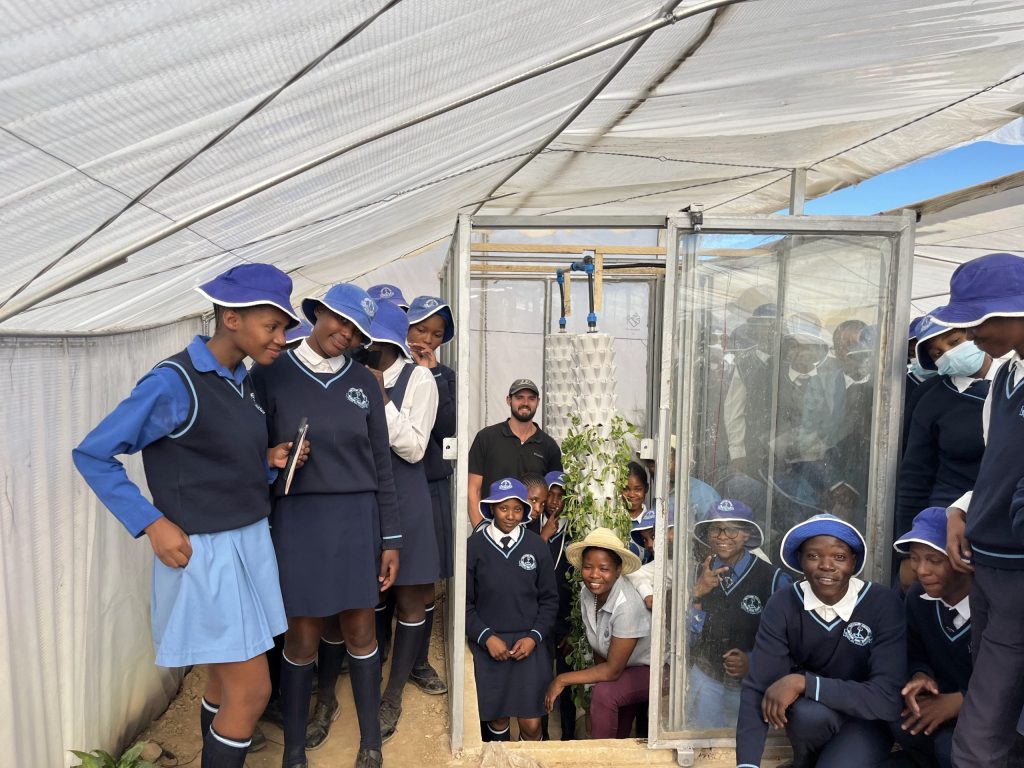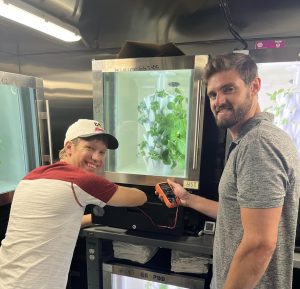
In the Kingdom of Lesotho, a lush greenhouse sits in the capital city, bursting with young seedlings. Tiisetso Sefatsane oversees the operation producing 200,000 seedlings every six weeks for households and farmers across the country.
Sefatsane is clear-eyed about the high stakes of what she’s doing. “We are running out of space for farming, water resources are depleted and chemicals are destroying soil biodiversity.” She continues: “It’s high time for youth and women to participate in the industry in order to improve the food insecurity the world is facing.”
You’d be forgiven for thinking this noble goal is distant from Indiana and Purdue University, but in fact, Sefatsane utilizes technology from a Purdue-affiliated and Indiana-based startup.
Purdue’s expertise spans the globe to address the problem of food insecurity.
FOOD INSECURITY ON THE RISE
Two staggering statistics underscore the stark reality of global food insecurity. Between 691 and 783 million people faced hunger in 2022. At the same time, the UN states around 13% of the food produced for humans globally was lost between harvest and retail.
Food loss may come from the spoilage of fresh crops that never make it off the farm. Other issues might arise due to poor-quality crops, inefficient supply chains or harvest disruption which leaves fresh produce to spoil. This doesn’t even consider populations who are unable to consistently access fresh, nutritionally dense food at markets or stores.
There is a disconnect between abundance and those experiencing food insecurity. Luckily, Purdue-affiliated companies are pursuing unique answers to this complex issue.
FROM SOUTHERN INDIANA TO THE KINGDOM OF LESOTHO

You might think something described as the “Nespresso for plants” is just a novelty product, but you’d be wrong. Anu is serious about changing the way we eat.
Co-founders Scott Massey and Ivan Ball got their start as students in Purdue’s College of Technology – now known as Purdue Polytechnic Institute – studying NASA-funded LED hydroponic growth systems with the College of Horticulture and Landscape Architecture’s Dr. Cary Mitchell. Soon they realized they wanted to focus on bringing fresh food to consumers with fully automated, in-home greenhouses.

In 2023, this dream got closer to reality when the Evansville-based company received a $200,000 Indiana Manufacturing Readiness Grant to mass manufacture its aeroponic seed pods in Southern Indiana. This greatly accelerated their capacity to empower those who want and need to grow Pure Produce® most. In the face of such a challenge, Massey reflects: “In some ways, I am astonished at the amount of progress we have achieved in a relatively short amount of time and capital, and in other ways I feel we are not doing nearly enough to address food insecurity.”
Massey continues to dream bigger, but there are plenty who see the benefits, like some residents of Lesotho, the small, high-altitude kingdom surrounded by South Africa.
The unlikely connection began in 2017 when Purdue’s longstanding involvement with the U.S. Department of State’s Mandela Washington Fellowship connected Scott with Africans wanting to learn more about alternative farming techniques in the face of climate change.

Since then, Massey has been on three reciprocal exchange projects, and Ball recently completed his first in Lesotho. In 2023 Massey brought a 100% solar-powered system to provide completely off-grid self-sufficiency for the grow-ring farm housed in Sefatsane’s greenhouse.
“Our people are sick and the largest factor is a lack of food for our households. To solve this issue, the country must improve the food security within communities,” says Sefatsane. The off-grid opportunity from anu is one such method for a safer future, even without reliable electricity.
Indoor growing is just one piece of the food security puzzle. What answers are there for large-scale agricultural producers?
ORANGE CORN FIGHTING HIDDEN HUNGER

Stepping into a NutraMaize field may feel like stepping into any other corn field but look a little closer. Something different becomes obvious. The corn is orange – more carrot than corn.
The company’s Orange Corn isn’t just unique and delicious; it’s also nutritionally dense compared to other corns.
Recently, the company has received a two-year, $650,000 Phase II Small Business Innovation Research grant from the U.S. Department of Agriculture as well as a three-year, $460,455 USDA NIFA research grant to demonstrate the health and pigmentation benefits of feeding orange corn to poultry on a commercial scale.
But it’s not just poultry that stands to benefit: NutraMaize’s enhanced orange corn is currently marketed through a line of premium milled products under the brand Professor Torbert’s Orange Corn. NutraMaize partners with HarvestPlus, an organization offering biofortified crops to people combatting “hidden hunger” around the world.
“We are so excited to be a part of spreading this message of hope for the future. As a company, we were founded on the belief that a better future is possible,” says CEO Evan Rocheford. “We are on a mission to improve the nutritional quality of common foods people eat every day.”
HARNESSING THE SUN FOR SAFE, LONG-LASTING FOOD

Growing good food is one thing – safe preservation after harvest remains an issue.
Even without the impacts of unstable external factors like extreme weather or social unrest, a major issue facing the smallholder farms that feed much of Asia and Africa is spoilage. Farmers often simply can’t get their food to market before it goes bad, which means a loss of income and vital food security for their community.
The Africa Food Systems Forum notes that in 2022, half of all Africans — around 650 million people across the continent — lack economic or physical access to sufficient food.
Klein Ileleji of Purdue University’s College of Agriculture seeks to change that with his company JUA Technologies. He is commercializing a solar dehydrator that mitigates spoilage without fossil fuels or other costly inputs.

It’s safe to say the solar dehydrator is a hit, garnering use and recognition across the globe. In 2022 the U.S. Small Business Administration recognized Dr. Klein Ileleji as the Indiana and the Great Lakes Regional Exporter of the Year for the portable solar dehydrator. At that time, Ileleji noted that it was a “multi-institutional effort led by Purdue University to reduce postharvest loss, promote economic growth, improve nutrition and enhance food security in Feed the Future target countries.”
The need for innovative answers to the problem is great, and ever-growing. From dehydrating herbs to store away for tea to crafting value-added products to sell at farmers markets, the Dehytray has far-reaching possibilities for farmers and hobbyists across the globe to ensure their next meal is safe to enjoy once harvested.
Because no one should have to wonder where their next meal is coming from. Purdue University is proud to support innovators like the founders of anu, NutraMaize and JUA Technologies who are taking giant leaps to make that better future a reality.
Have a novel solution to food insecurity? Visit Purdue Innovates’ website to learn more about its entrepreneurial support and resources.
Author: Polly Barks